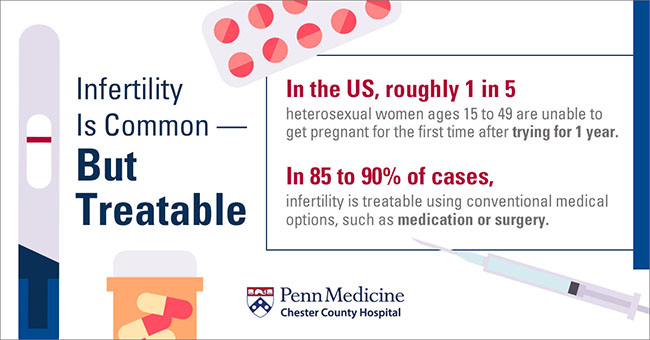
Growing up, there are probably many plans you envisioned for your adult self. Maybe you wanted to earn your college degree, travel the world, find that special someone, or invest in the perfect house. Maybe you wanted to invent something that would change the world for the better.
And maybe you wanted to have a baby.
Similar to other life goals, being able to get pregnant and have a baby is often thought of as a given. But difficulty getting pregnant is not only possible — it’s common.
Infertility is when you are unable to get pregnant (or conceive) after one year of unprotected sex. If you can get pregnant, but continue to have miscarriages or stillbirths, that's also considered infertility. Because a woman’s fertility is known to decrease with age, not being able to conceive after 6 months if you’re over the age of 35 is also categorized as infertility.
 June is World Infertility Awareness Month,
June is World Infertility Awareness Month, a time to recognize the common difficulties faced by those struggling to become pregnant. It’s also an opportunity to learn more about what options you have to achieve the life you imagine for yourself.
Here’s a closer look at infertility — and what treatments are available.
What Causes Infertility?
One of the biggest misconceptions about infertility is that it comes down to a woman’s inability to conceive. However, in a heterosexual couple, infertility is traced back to both the man and woman equally. And in many cases, there is no clear cause.
Fortunately, research surrounding infertility has provided healthcare experts with plenty of information about what might cause infertility in both men and women.
Infertility in Men
In men, infertility is usually evaluated using a semen analysis. This looks at the number of sperm (concentration), how the sperm moves (motility), and the shape of the sperm (morphology).
Factors that may contribute to infertility in men include:
- Problems with testicular or ejaculatory function, such as trauma to the testes, heavy alcohol use, cancer treatments, and medical conditions, like diabetes and cystic fibrosis
- Improper function of the pituitary or hypothalamus glands, which are both glands in the brain that make hormones that maintain testicular function
- Other hormonal disorders, such as pituitary tumors (either cancerous or noncancerous) and Cushing’s syndrome (when the body makes too much cortisol)
- Genetic disorders, such as Klinefelter’s syndrome (when males have an extra X chromosome) and Y-chromosome infertility (a condition that affects a male’s production of sperm)
Infertility in Women
In women, infertility is slightly more complex. In order to get pregnant, women need functioning ovaries, fallopian tubes, and a uterus. Health conditions that impact any of these organs can lead to female infertility.
Conditions in women that may cause infertility include:
- Problems with ovarian function, such as polycystic ovary syndrome (when women don’t ovulate or ovulate irregularly) and diminished ovarian reserve (when there are fewer eggs left in the ovaries than expected for a woman’s age)
- Fallopian tube obstruction, which can be caused by factors like pelvic infection, ruptured appendix, and chlamydia
- The physical makeup of the uterus, such as if there are fibroids (noncancerous tumors) or endometrial polyps (growths on the wall of the uterus)
- Menopause, which is when a woman has not had a period for at least 1 year
What Are My Treatment Options for Infertility?
Thanks to the growing knowledge surrounding infertility, there are a wide range of options that may help you to get pregnant and carry to term successfully.
In both men and women, the first step is determining the cause of infertility. This, along with other factors, like how long you’ve been trying to get pregnant, your age, and your treatment preferences, will determine what options work best for you.
Infertility treatment options for men include:
- Medication, such as those to treat hormone problems and erectile dysfunction
- Surgery, such as procedures to mend blockages in the tubes that carry sperm from the testicles to the penis
Infertility treatment options for women include:
- Medications to encourage ovulation (when an egg is released for fertilization)
- Surgery to remove blockages in the fallopian tubes, patches of endometriosis, or uterine fibroids
- Treatment for polycystic ovary syndrome (PCOS), such as weight loss or hormone therapy
If these options are unsuccessful, Assisted Reproductive Technology (ART) can be an effective way to get pregnant.
Overcoming Infertility with Assisted Reproductive Technology
Assisted Reproductive Technologies (ARTs) are procedures that can help you get pregnant, especially if other infertility treatment options aren’t working.
ART is a common way to overcome infertility. In 2019, nearly 84,000 babies were born using ART in the US.
ART options include:
- Intrauterine insemination (IUI), which involves placing sperm into the uterus using a long, narrow tube. This is sometimes done in combination with medication to promote ovulation.
- In Vitro Fertilization (IVF), which involves joining the egg and sperm together in a lab to create an embryo. The embryo is then placed in the uterus, where it may implant and lead to pregnancy.
- Third Party-Assisted ART, such as sperm or egg donation, surrogates (when a third-party woman is inseminated with sperm from the couple), and gestational carriers (when a third-party woman is implanted with an embryo — the egg and sperm already joined together — from the couple).
When Should I See My Healthcare Provider About Infertility?
Getting pregnant can take time for any couple. That’s why it can be hard to know if you’re experiencing problems with infertility.
However, there are general guidelines to help you know when you might need extra support getting pregnant. See your healthcare provider if you are:
- Younger than 35, don’t have any known health conditions, have regular menstrual periods, and cannot get pregnant for a year
- Over 35 and cannot get pregnant for 6 months
- Over 40 (as soon as you start trying to conceive)
No matter what age you are, keep the communication lines with your healthcare provider open. If you’re planning to try to get pregnant at any age, let your provider know. They can help you get your body ready for a healthy pregnancy, discuss fertility, and provide tips to conceive.
Infertility is a common but not frequently discussed concern for both men and women. Fortunately, if you do experience infertility concerns, you have plenty of options to help you start the family you’ve always wanted.
Make an appointment with a Chester County Hospital Obstetrician or Reproductive Endocrinologist to learn more about what can cause infertility and what options you have.